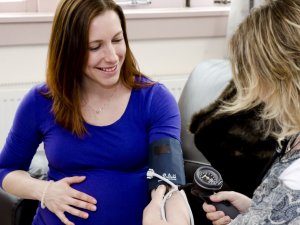Respiratory physician Lutz Beckert considers chronic obstructive pulmonary disease management, including the prevention of COPD, the importance of smoking cessation and pulmonary rehabilitation, and the lifesaving potential of addressing treatable traits. He also discusses the logic of inhaler therapy, moving from single therapy to dual and triple therapy when indicated, as well as other aspects of management
Call to put prevention at forefront of maternal injury law
Call to put prevention at forefront of maternal injury law

“A lot of the time people don’t want to talk about it, because it’s your pelvis, your vagina, your rectum, it’s a sensitive area”
A patient advocacy group says prevention needs to be at the forefront of ACC’s new maternal birth injury legislation.
The Accident Compensation (Maternal Birth Injury and Other Matters) Amendment Bill doesn’t go far enough to protect women and their families, says group secretary Kirsty Watt.
In a written submission on the bill, the group Advocating for Pelvic Health Empowerment and Rehabilitation for Mothers says more women are experiencing pelvic floor disorders and injuries before and after birth.
The bill’s scope should be widened to include any injury, from the onset of labour to the completion of delivery, and the bill should be retrospective, the group says.
A multidisciplinary group of health professionals and consumers, group members came together because they say women are struggling unnecessarily to get the help they need.
Ms Watt and co-petitioner Don Wilson, emeritus professor of obstetrics and gynaecology at the University of Otago, call for ACC to develop a women’s healthcare strategy, with prevention at the forefront.
“The fact that many women are not receiving any treatment at all after birth and that they are unable to prevent further injury and harm is hugely concerning,” they say.
“While we support the changes that this bill is considering, we all agree that these changes do not go far enough by only covering a small portion of birth related injuries, and excluding these conditions does not represent ACC’s values.”
In September last year, ACC minister Carmel Sepuloni announced bill would benefit 17,000 to 18,000 more women a year and improve access to treatment such as surgery and physiotherapy.
The bill passed its first reading in mid-December, and is now before the education and workforce select committee. Submissions on the bill closed on 11 February, and a report is expected on 14 June.
Ms Watts says ideally, every single injury experienced at birth should be covered by the bill, including psychological trauma.
In her role as a personal trainer, she has found many women don’t receive treatment for years, or ever.
“A lot of the time people don’t want to talk about it, because it’s your pelvis, your vagina, your rectum, it’s a sensitive area.
“We find that, once you’ve had a baby, no one checks up on you – everything is about the baby. There is no general warrant of fitness check or rehabilitation plan…I want to see that change.”
The bill needs to allow improved education, and access to preventive and rehabilitative treatment.: “There are women who won’t leave the house because they are faecally incontinent, they’ve sustained such an injury that they’ll never return to work.”
Professor Wilson, a urogynaecologist, says the group’s petition and submission centre around prevention of pelvic floor disorders, with the aim of all women having access to publicly funded pelvic floor treatment before and after birth by 2025.
“If ACC are extending cover, then we would expect ACC to increase investment in prevention.”
He calls for better education, screening and treatment, during pregnancy and after, by all healthcare providers and says the group has developed a care and prevention pathway.
The submission states that pelvic floor disorders are now at epidemic levels.
Ms Watts says that, of 60,000 women who give birth every year, one in three will have an incontinence issue.
Around 50 per cent will have a prolapse and one in 12 of those will have prolapse that significantly affects their uterus, cervix, bladder or bowel.
A health professional can examine a woman’s pelvic floor, identifying potential issues, during pregnancy, she says.
We've published this article as a FREE READ so it can be read and shared more widely. Please think about supporting us and our journalism – subscribe here





![Barbara Fountain, editor of New Zealand Doctor Rata Aotearoa, and Paul Hutchison, GP and senior medical clinician at Tāmaki Health [Image: Simon Maude]](/sites/default/files/styles/thumbnail_cropped_100/public/2025-03/Barbara%20Fountain%2C%20editor%20of%20New%20Zealand%20Doctor%20Rata%20Aotearoa%2C%20and%20Paul%20Hutchison%2C%20GP%20and%20senior%20medical%20clinician%20at%20T%C4%81maki%20Health%20CR%20Simon%20Maude.jpg?itok=-HbQ1EYA)
![Lori Peters, NP and advanced health improvement practitioner at Mahitahi Hauora, and Jasper Nacilla, NP at The Terrace Medical Centre in Wellington [Image: Simon Maude]](/sites/default/files/styles/thumbnail_cropped_100/public/2025-03/2.%20Lori%20Peters%2C%20NP%20and%20advanced%20HIP%20at%20Mahitahi%20Hauora%2C%20and%20Jasper%20Nacilla%2C%20NP%20at%20The%20Terrace%20Medical%20Centre%20in%20Wellington%20CR%20Simon%20Maude.jpg?itok=sUfbsSF1)
![Ministry of Social Development health and disability coordinator Liz Williams, regional health advisors Mary Mojel and Larah Takarangi, and health and disability coordinators Rebecca Staunton and Myint Than Htut [Image: Simon Maude]](/sites/default/files/styles/thumbnail_cropped_100/public/2025-03/3.%20Ministry%20of%20Social%20Development%27s%20Liz%20Williams%2C%20Mary%20Mojel%2C%20Larah%20Takarangi%2C%20Rebecca%20Staunton%20and%20Myint%20Than%20Htut%20CR%20Simon%20Maude.jpg?itok=9ceOujzC)
![Locum GP Helen Fisher, with Te Kuiti Medical Centre NP Bridget Woodney [Image: Simon Maude]](/sites/default/files/styles/thumbnail_cropped_100/public/2025-03/4.%20Locum%20GP%20Helen%20Fisher%2C%20with%20Te%20Kuiti%20Medical%20Centre%20NP%20Bridget%20Woodney%20CR%20Simon%20Maude.jpg?itok=TJeODetm)
![Ruby Faulkner, GPEP2, with David Small, GPEP3 from The Doctors Greenmeadows in Napier [Image: Simon Maude]](/sites/default/files/styles/thumbnail_cropped_100/public/2025-03/5.%20Ruby%20Faulkner%2C%20GPEP2%2C%20with%20David%20Small%2C%20GPEP3%20from%20The%20Doctors%20Greenmeadows%20in%20Napier%20CR%20Simon%20Maude.jpg?itok=B0u4wsIs)
![Rochelle Langton and Libby Thomas, marketing advisors at the Medical Protection Society [Image: Simon Maude]](/sites/default/files/styles/thumbnail_cropped_100/public/2025-03/6.%20Rochelle%20Langton%20and%20Libby%20Thomas%2C%20marketing%20advisors%20at%20the%20Medical%20Protection%20Society%20CR%20Simon%20Maude.jpg?itok=r52_Cf74)
![Specialist GP Lucy Gibberd, medical advisor at MPS, and Zara Bolam, urgent-care specialist at The Nest Health Centre in Inglewood [Image: Simon Maude]](/sites/default/files/styles/thumbnail_cropped_100/public/2025-03/7.%20Specialist%20GP%20Lucy%20Gibberd%2C%20medical%20advisor%20at%20MPS%2C%20and%20Zara%20Bolam%2C%20urgent-care%20specialist%20at%20The%20Nest%20Health%20Centre%20in%20Inglewood%20CR%20Simon%20Maude.jpg?itok=z8eVoBU3)
![Olivia Blackmore and Trudee Sharp, NPs at Gore Health Centre, and Gaylene Hastie, NP at Queenstown Medical Centre [Image: Simon Maude]](/sites/default/files/styles/thumbnail_cropped_100/public/2025-03/8.%20Olivia%20Blackmore%20and%20Trudee%20Sharp%2C%20NPs%20at%20Gore%20Health%20Centre%2C%20and%20Gaylene%20Hastie%2C%20NP%20at%20Queenstown%20Medical%20Centre%20CR%20Simon%20Maude.jpg?itok=Z6u9d0XH)
![Mary Toloa, specialist GP at Porirua and Union Community Health Service in Wellington, Mara Coler, clinical pharmacist at Tū Ora Compass Health, and Bhavna Mistry, specialist GP at Porirua and Union Community Health Service [Image: Simon Maude]](/sites/default/files/styles/thumbnail_cropped_100/public/2025-03/9.%20Mary%20Toloa%2C%20Porirua%20and%20Union%20Community%20Health%20Service%20in%20Wellington%2C%20Mara%20Coler%2C%20T%C5%AB%20Ora%20Compass%20Health%2C%20and%20Bhavna%20Mistry%2C%20PUCHS%20CR%20Simon%20Maude.jpg?itok=kpChr0cc)